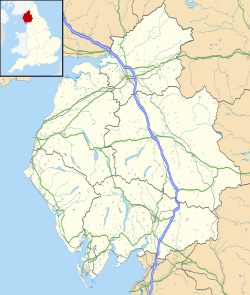Milefortlet 4 (Herd Hill) was a Milefortlet of the Roman Cumbrian Coast defences. These milefortlets and intervening stone watchtowers extended from the western end of Hadrian's Wall, along the Cumbrian coast and were linked by a wooden palisade. They were contemporary with defensive structures on Hadrian's Wall. There is little to see on the ground but Milefortlet 4 has been located by archaeologists.
| Milefortlet 4 | |
|---|---|
 Fields by the Solway Firth, and the approximate site of Milefortlet 4 | |
| Type | Milecastle |
| Place in the Roman world | |
| Province | Britannia |
| Location | |
| Coordinates | 54°55′35″N 3°17′21″W / 54.926352°N 3.289258°W |
| County | Cumbria |
| Country | England |
| Reference | |
| UK-OSNG reference | NY17475983 |
Description
editMilefortlet 4 is situated at the seaward edge of a low ridge, just north of the hamlet of Cardurnock in the civil parish of Bowness. It was located in 1945 by the finding of turfwork on Herd Hill.[1] There is nothing to see from the ground but a geophysical survey of the site was undertaken in 1994 and the precise position of the milefortlet was located.[1]
Associated Towers
editEach milefortlet had two associated towers, similar in construction to the turrets built along Hadrian's Wall. These towers were positioned approximately one-third and two-thirds of a Roman mile to the west of the Milefortlet, and would probably have been manned by part of the nearest Milefortlet's garrison. The towers associated with Milefortlet 4 are known as Tower 4A (grid reference NY172594) and Tower 4B (grid reference NY17115888).[2][3]
The position of Tower 4A is uncertain, although it thought to lie on the crest of a ridge with good views seaward.[2] Tower 4B is located in a field west of Cardurnock. It was excavated by in 1977, which located three sides of the tower surviving as robber trenches: the western side having been completely eroded.[3] The tower was interpreted as having had three phases: in the first two phases palisade structures were built, but in the third phase these were abandoned and a stone tower was built.[3]
References
edit- ^ a b Historic England, "Milefortlet 4 (9613)", Research records (formerly PastScape), retrieved 26 November 2013
- ^ a b Historic England, "Tower 4A (9617)", Research records (formerly PastScape), retrieved 26 November 2013
- ^ a b c Historic England, "Cardurnock Tower 4B (9610)", Research records (formerly PastScape), retrieved 26 November 2013
